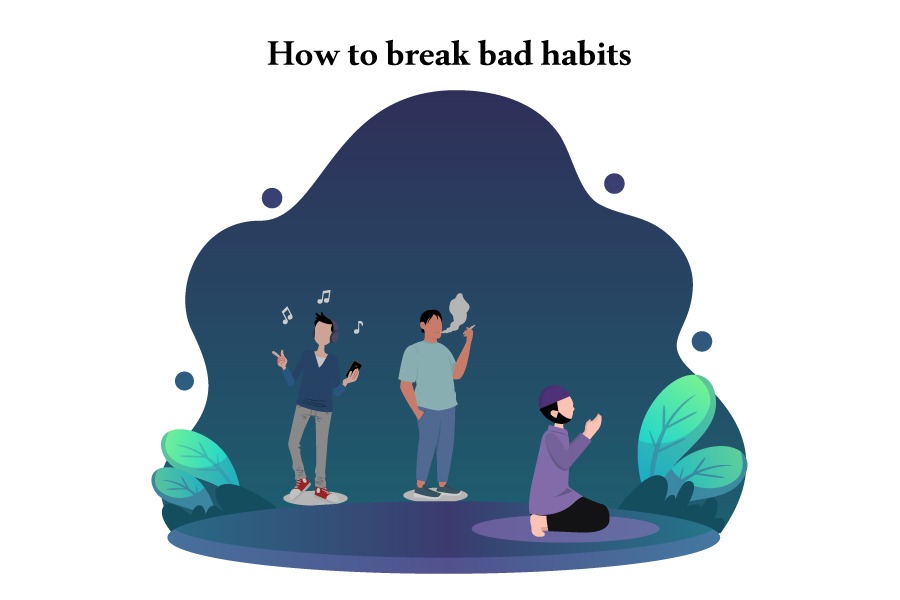In our daily lives, we often find ourselves struggling with various bad habits that hinder our spiritual growth and overall well-being. Breaking free from these habits can be challenging, but from an Islamic perspective, some guidelines and principles can help us overcome them. It explores practical steps and advice based on Islamic teachings to break bad habits and lead a more fulfilling life.
How to break bad Habits?
Breaking bad habits can be challenging, but with the right strategies and mindset, it is definitely possible. Here are some steps you can take to break bad habits,
-
Seeking Knowledge and Awareness
The first step in breaking bad habits is to seek knowledge and increase our awareness of their consequences. By understanding the harmful effects of these habits, we become more motivated to change. Islamic teachings emphasize the importance of seeking knowledge and understanding the consequences of our actions.
-
Self-Reflection and Repentance
Self-reflection is crucial in identifying and acknowledging our bad habits. By honestly assessing ourselves, we can recognize our weaknesses and the areas we need to improve. Repentance plays a significant role in seeking forgiveness from Allah and purifying our hearts.
-
Building Strong Willpower
Breaking bad habits requires strong willpower and determination. Islam teaches us to cultivate self-discipline and strengthen our willpower through various acts of worship, such as prayer, fasting, and self-restraint.
-
Surrounding Yourself with Positive Influences
The company we keep greatly influences our behavior and habits. It is essential to surround ourselves with individuals who encourage and inspire us to do good. By choosing positive influences, we create an environment conducive to breaking bad habits.
-
Seeking Support from the Community
The Islamic community provides valuable support in overcoming bad habits. Engaging with like-minded individuals, participating in study circles, and seeking guidance from knowledgeable scholars can provide the necessary encouragement and accountability to break free from negative patterns.
-
Setting Realistic Goals and Taking Small Steps
Setting realistic goals is vital when working towards breaking bad habits. By breaking down the process into smaller, achievable steps, we can maintain motivation and track our progress effectively.
-
Replacing Bad Habits with Good Ones
Instead of merely trying to eliminate bad habits, it is often more effective to replace them with good ones. Islam emphasizes the importance of engaging in acts of worship, performing charitable deeds, and cultivating positive habits that align with the teachings of the Quran and Sunnah.
-
Consistency and Perseverance
Consistency and perseverance are key to breaking bad habits. Change takes time and effort, and it is essential to remain committed even when faced with challenges. By consistently striving to improve ourselves, we gradually weaken the hold of bad habits.
-
Strengthening Your Relationship with Allah
A strong connection with Allah is a source of strength and guidance. By increasing our devotion, seeking His forgiveness, and supplicating to Him, we can find solace and support in our journey to break bad habits.
-
Fasting and Self-Discipline
Fasting is not only an act of worship but also a means to develop self-discipline. By observing regular fasting, we learn to control our desires and strengthen our willpower, making it easier to overcome bad habits.
-
Reminding Yourself of the Consequences
Constantly reminding ourselves of the consequences of our bad habits can serve as a powerful deterrent. By reflecting on the negative impacts they have on our lives and our relationship with Allah, we reinforce our motivation to break free from them.
-
Seeking Forgiveness and Asking for Divine Help
In times of difficulty, seeking forgiveness from Allah and asking for His help is essential. Through sincere repentance and supplication, we seek His mercy and guidance, knowing that true change comes from His divine assistance.
-
Maintaining a Balanced Lifestyle
Maintaining a balanced lifestyle is key to breaking bad habits in the long run. Islam encourages moderation in all aspects of life, including our habits and desires. By finding a balance between our worldly responsibilities and spiritual growth, we create a foundation for positive change.
-
Seeking Professional Help if Needed
In some cases, breaking bad habits may require professional help, such as therapy or counseling. Islam encourages seeking knowledge and utilizing resources available to improve one’s well-being. If necessary, do not hesitate to seek professional guidance to overcome challenging habits.
Dua to stop bad habits
Dua is a form of communication between a believer and Allah (SWT). It is an act of supplication, where we express our needs, desires, and aspirations to our Creator. Dua holds immense power and can bring about positive changes in our lives. By turning to Allah and seeking His guidance and assistance, we acknowledge our dependency on Him and invite His divine intervention in our struggles to overcome bad habits. The most important step to take is to offer 5 prayers a day and seek help from Allah. As it is mentioned in the Quran,
ٱتْلُ مَآ أُوحِىَ إِلَيْكَ مِنَ ٱلْكِتَٰبِ وَأَقِمِ ٱلصَّلَوٰةَ ۖ إِنَّ ٱلصَّلَوٰةَ تَنْهَىٰ عَنِ ٱلْفَحْشَآءِ وَٱلْمُنكَرِ ۗ وَلَذِكْرُ ٱللَّهِ أَكْبَرُ ۗ وَٱللَّهُ يَعْلَمُ مَا تَصْنَعُونَ
Recite, [O Muhammad], what has been revealed to you of the Book and establish prayer. Indeed, prayer prohibits immorality and wrongdoing, and the remembrance of Allāh is greater. And Allāh knows that which you do.
(AlQuran 29:45)
And here are a few recommended prayers to get rid of bad habits
اَللَّهُمَّ إِنَّي أَعُوذُ بِكَ مِنْ شَرِّ مَا عَمِلْتُ وَمِنْ شَرِّ مَا لَمْ أَعْمَلْ
Allaahumma ‘innee a’oothu bika min sharri maa ‘amiltu, wa min sharri maa lam a’mal
O Allah! I seek refuge in You from the evil of what I have done, and from the evil of what I have not done.
(Sahi Muslim 4/2085)
The Dua of Prophet Ibraham (AS) which recited all the time for the blessings and goods in this life and Hereafter,
وَمِنْهُمْ مَنْ يَقُولُ رَبَّنَا آتِنَا فِي الدُّنْيَا حَسَنَةً وَفِي الآخِرَةِ حَسَنَةً وَقِنَا عَذَابَ النَّارِ
Our Lord, give us good in this world and good in the Hereafter, and save us from the punishment of Fire.
(AlQuran 2:201)
Seek repeatedly forgiveness for your every wrong acts, and always remember Allah is the Most Merciful and Most Forgiving,
أَسْتَغْفِرُ اللَّهَ الْعَظِيمَ الَّذِي لاَ إِلَهَ إِلاَّ هُوَ الْحَيُّ الْْقَيُّومُ وَ أَتُوبُ إِلَيْهِ
“Astaghfirullah al-‘Adheemal-ladhi la ilaha illa Huwal-Hayyul-Qayyum wa atubu ilaih.”
I seek the forgiveness of Allah the Mighty, Whom there is none worthy except Him, the Living, The Eternal, and I repent unto Him.
And one more Dua to recite,
“Oh Allah, I seek refuge in You from all forms of evil, whether apparent or hidden. I seek Your protection from the whispers of Satan and the temptations that lead me astray. Grant me the strength and willpower to overcome my bad habits and replace them with good deeds. Help me purify my heart and guide me toward righteousness.
O Allah, make me steadfast in my resolve to break free from these harmful habits and grant me the ability to resist the temptations that come my way. I acknowledge my weaknesses and shortcomings, and I turn to You for assistance. Bestow Your mercy upon me and grant me the strength to overcome these challenges. Indeed, You are the All-Powerful, the All-Merciful. Ameen.”
How Quran helps you to overcome bad habits?
The Quran is a divine book that provides guidance and wisdom for all aspects of life. By studying and understanding its teachings, we gain insights into what is right and wrong, and we develop a deeper understanding of the consequences of our actions.
It teaches us to seek Allah’s help and guidance in all matters. It reminds us that true transformation and change come from Allah’s assistance. By turning to Allah in prayer and supplication, we humbly seek His intervention to help us overcome our bad habits. This reliance on Allah strengthens our resolve and grants us the inner strength to overcome our shortcomings.
Make the most of every moment and embark on a transformative journey of learning the Quran. You have the invaluable choice to engage with esteemed Quran Learning Institutions or explore the convenience of Online Quran Classes platforms, such as AlQuranClasses.
Conclusion
Breaking bad habits is a journey that requires commitment, self-reflection, and reliance on Allah’s guidance. By following the principles outlined in Islamic teachings, we can overcome our weaknesses and lead a more fulfilling life. Remember to seek knowledge, surround yourself with positive influences, and remain consistent in your efforts. Through sincere repentance, supplication, and seeking Allah’s forgiveness, we can break free from our bad habits and strive towards becoming better individuals.
Frequently Asked Questions
-
Can breaking bad habits from an Islamic perspective improve my overall well-being?
Yes, breaking bad habits from an Islamic perspective can lead to improved physical, mental, and spiritual well-being. It allows you to align your actions with the teachings of Islam and develop positive habits that contribute to a healthier lifestyle.
-
Is seeking professional help allowed in Islam to break bad habits?
Yes, seeking professional help, such as therapy or counseling, is allowed in Islam if it is beneficial and necessary for breaking bad habits. Islam encourages seeking knowledge and utilizing resources to improve one’s well-being.
-
How can fasting help in breaking bad habits?
Fasting in Islam is not only a religious obligation but also a means to develop self-discipline. By observing regular fasting, you can learn to control your desires and strengthen your willpower, which can aid in breaking bad habits.
-
Our company has an impact on our habits. Is it True
Yes, the people we surround ourselves with have a significant impact on our behavior and habits. When we choose to associate with positive influences, we create an environment that nurtures our journey towards positive change. On the other hand, being around individuals who engage in bad habits and harbor negative thoughts can attract us towards engaging in harmful actions.
-
How long does it take to break a bad habit from an Islamic perspective?
Breaking a bad habit is a personal journey, and the time it takes may vary from person to person. It requires consistency, perseverance, and reliance on Allah’s guidance. With sincere efforts and commitment, you can gradually weaken the hold of bad habits and overcome them.

















